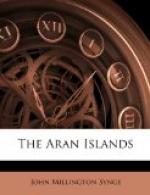In spite of the charm of my teacher, the old blind man I met the day of my arrival, I have decided to move on to Inishmaan, where Gaelic is more generally used, and the life is perhaps the most primitive that is left in Europe.
I spent all this last day with my blind guide, looking at the antiquities that abound in the west or north-west of the island.
As we set out I noticed among the groups of girls who smiled at our fellowship—old Mourteen says we are like the cuckoo with its pipit—a beautiful oval face with the singularly spiritual expression that is so marked in one type of the West Ireland women. Later in the day, as the old man talked continually of the fairies and the women they have taken, it seemed that there was a possible link between the wild mythology that is accepted on the islands and the strange beauty of the women.
At midday we rested near the ruins of a house, and two beautiful boys came up and sat near us. Old Mourteen asked them why the house was in ruins, and who had lived in it.
‘A rich farmer built it a while since,’ they said, ’but after two years he was driven away by the fairy host.’
The boys came on with us some distance to the north to visit one of the ancient beehive dwellings that is still in perfect preservation. When we crawled in on our hands and knees, and stood up in the gloom of the interior, old Mourteen took a freak of earthly humour and began telling what he would have done if he could have come in there when he was a young man and a young girl along with him.
Then he sat down in the middle of the floor and began to recite old Irish poetry, with an exquisite purity of intonation that brought tears to my eyes though I understood but little of the meaning.
On our way home he gave me the Catholic theory of the fairies.
When Lucifer saw himself in the glass he thought himself equal with God. Then the Lord threw him out of Heaven, and all the angels that belonged to him. While He was ‘chucking them out,’ an archangel asked Him to spare some of them, and those that were falling are in the air still, and have power to wreck ships, and to work evil in the world.
From this he wandered off into tedious matters of theology, and repeated many long prayers and sermons in Irish that he had heard from the priests.
A little further on we came to a slated house, and I asked him who was living in it.
‘A kind of a schoolmistress,’ he said; then his old face puckered with a gleam of pagan malice.
‘Ah, master,’ he said, ’wouldn’t it be fine to be in there, and to be kissing her?’
A couple of miles from this village we turned aside to look at an old ruined church of the Ceathair Aluinn (The Four Beautiful Persons), and a holy well near it that is famous for cures of blindness and epilepsy.
As we sat near the well a very old man came up from a cottage near the road, and told me how it had become famous.




